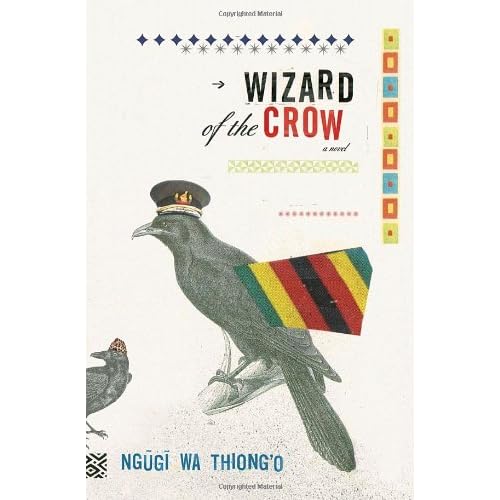I know it's kinda early to talk about March, but I just start this new book and it's kinda thick so it's going to take a while to read.
Wizard of the Crow by Ngugi wa Thiong'o

In the year in which the despotic leader of the fictional African nation of Aburiria announces a grand scheme to build the world's tallest building, Kamiti, a luckless job seeker, wakes up on a rubbish heap to find himself possessed of magical powers.
So begins Wizard of the Crow, Ngugi wa Thiong'o's epic African political satire, his first novel in 20 years. Daunting in its ambition and scale, spanning more than 700 pages, it is, in the author's own words, the story of "Africa of the twentieth century in the context of two thousand years of world history."
The Aburiria of Ngugi's imagination is representative of many African dictatorships. Its leader -- known only as "the Ruler" -- and his band of sycophantic and feuding ministers govern (the term is used loosely) through a blend of showmanship and brutality. Corruption is rife, the economy nonexistent, and the giant building -- "Marching to Heaven" -- is intended to shore up their leader's popularity. In the era of globalization, all those who have fought for Africa's soul in the past -- church, despots and sorcerers -- are now joined by the Global Bank, on whom the government depends to finance its project.
[...]These flights of the imagination, the merging of real and unreal worlds, are in keeping with the qualities of African oral literature, as is the fast-paced narrative, marked by short chapters packed with continuous action.[...]
Wizard of the Crow is first and foremost a great, spellbinding tale, probably the crowning glory of Ngugi's life's work. He has done for East Africa what Ahmadou Kourouma's Waiting for the Wild Beasts to Vote did for West Africa: He has turned the power of storytelling into a weapon against totalitarianism.
Wizard of the Crow by Ngugi wa Thiong'o

In the year in which the despotic leader of the fictional African nation of Aburiria announces a grand scheme to build the world's tallest building, Kamiti, a luckless job seeker, wakes up on a rubbish heap to find himself possessed of magical powers.
So begins Wizard of the Crow, Ngugi wa Thiong'o's epic African political satire, his first novel in 20 years. Daunting in its ambition and scale, spanning more than 700 pages, it is, in the author's own words, the story of "Africa of the twentieth century in the context of two thousand years of world history."
The Aburiria of Ngugi's imagination is representative of many African dictatorships. Its leader -- known only as "the Ruler" -- and his band of sycophantic and feuding ministers govern (the term is used loosely) through a blend of showmanship and brutality. Corruption is rife, the economy nonexistent, and the giant building -- "Marching to Heaven" -- is intended to shore up their leader's popularity. In the era of globalization, all those who have fought for Africa's soul in the past -- church, despots and sorcerers -- are now joined by the Global Bank, on whom the government depends to finance its project.
[...]These flights of the imagination, the merging of real and unreal worlds, are in keeping with the qualities of African oral literature, as is the fast-paced narrative, marked by short chapters packed with continuous action.[...]
Wizard of the Crow is first and foremost a great, spellbinding tale, probably the crowning glory of Ngugi's life's work. He has done for East Africa what Ahmadou Kourouma's Waiting for the Wild Beasts to Vote did for West Africa: He has turned the power of storytelling into a weapon against totalitarianism.
Comment